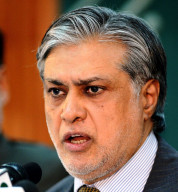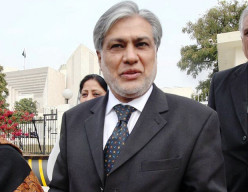
ISLAMABAD:
In the largest-ever single transaction, Pakistan has been able to raise $2 billion from international debt markets through the issuance of five- and 10-year dollar-denominated Euro bonds, taking a giant step towards meeting an International Monetary Fund (IMF) condition of increasing its gross official reserves to $9 billion.
It was the highest amount that Pakistan has ever raised in a single attempt and shows the increasing confidence of international investors on policies of the PML-N government, according to analysts.
“Pakistan’s bond was highly over-subscribed and received $5.2 billion offers but we decided to accept $2 billion,” Rana Assad Amin, the Ministry of Finance spokesman, told The Express Tribune.
Amin said that against the initial expectations of raising $500 million, the investor response was overwhelmingly strong and the order-books were oversubscribed across the two tranches, consisting of over 400 orders from high quality investors.
The government has raised $1 billion in five years and 10-year tenors, respectively, according to a handout issued by the finance ministry. However, the government decided to pay a high cost for venturing into international debt markets after a gap of seven years.

The $1 billion has been raised for five-year at a fixed rate of 7.25%, which is 5.58 % over and above the benchmark five-year US Treasury rate. The rest of the $1 billion was generated through 10-year bonds at a fixed rate of 8.25%, which is 5.56% above the corresponding 10-year US Treasury benchmark rate.
In 2007, the General Musharraf government had issued 10-year bonds at a 6.75% interest rate, which was 3.25% above the US treasury rates at that time.
As against the high premium that Islamabad chose to pay, Sri Lanka on Tuesday sold $500 million five-year bonds at a 5.1%. Pakistan has a junk credit rating of Caa1 by Moody’s Investors Service, which increased the cost of borrowings.
Under $6.8 billion bailout package, the IMF has asked Pakistan to increase its gross official reserves to $9.4 billion by end of June this year. As of end March, the gross official reserves stood at $5.17 billion, requiring the government to raise another $4.3 billion in three months. After successful issuance of Euro bonds, the government is betting on the World Bank and the Asian Development Bank to meet the remaining shortfall.
According to the Ministry of Finance, the five year bonds were distributed across all major geographic regions with 59% going to the US investors, 19% to UK, 10% to Europe, 10% to Asia and 2% to others. The Fund managers took 84% of the five year issue, banks 8%, hedge funds 7% and insurance company and pension funds 1%.
The Finance Ministry said that the 10-year bonds were distributed 61% in the US, 21% in UK, 12% in Europe, 5% in Asia and Middle East and 1% others. Fund managers took 86% of the ten year issue, hedge funds 9%, banks 4%, insurance company/ pension funds 1%.
The low interest rate in the United States was also a main factor behind success of Pakistan’s bonds, according to the analysts. They said high premium has also set a benchmark for future as well.
Two Pakistani teams held the road shows. A team headed by the Finance Minister Ishaq Dar visited Dubai, London and New York and another team headed by the Finance Secretary Dr Waqar Masood visited Singapore, Hong Kong, Los Angeles, San Francisco and Boston.
Regaining access to the international capital markets will constitute important factor in supporting the multilateral flows, said Rana Assad Amin. He said demonstrating the ability to raise financing from a diverse pool of investors was a positive sign for all stakeholders.
Published in The Express Tribune, April 10th, 2014.
COMMENTS (10)
Comments are moderated and generally will be posted if they are on-topic and not abusive.
For more information, please see our Comments FAQ



































































Good luck to the subscribers of these bonds in recovering their "investment"
Just compare the soverign rating of two countries. You will get the answer.
How come sole Islamic Nuclear Power of Pakistan winds up paying usurious 7.25% interest on 5 year US Dollar Bond when Sri Lanka gets away with paying 5.125 % on a 5 year US Dollar bond that too just two days before Pakistan issued her bonds?
On markup of 7% and 8%...! when international rates are around 3 to 4 present, and how we are going to re-pay these bonds after maturity??? More IMF/WB loan. Hats off to Economic Gurus. Love these number games.
Well done Pakistan. This OMO will go long way in restoring the confidence of International community. However only worrying part of the whole exercise is, a very high stake of hedge funds in 10 years bonds. These guys will dump the bonds at even slight indication of faltering economy or any political turmoil. But good job done nevertheless!
The rates were just too good. This wont be easy to pay off.
Happy to see international investors' confidence in Pakistan's economic outlook. Let's wait for the domestic pessimists to point out the issues in this good news.
People will lend as long as the price is right for them.
The rate paid here is much worse than being paid by Greece ... which is a bankrupt country and has seriously defaulted on its debt.
To satisfy the IMF and as Ishaq Dar could not get our house in order we had to offer such high interest rates that would further cripple us. We will now have to pay $160 million each year just to be able to show that we have an extra $2bn in reserves....which is a massive drain on our nonexistent resources.
Very poor performance. We have not only set a poor benchmark price for the next 10 years, we have added a burden of Rs 16 billion annually for interest only...plus principal at the end of the tenors.
This is the 3rd article in the last 24 hours about this news. Why so much news recycling?
You got robbed with high rate you will have to pay and you are doing a victory lap? It’s not confidence in your policies its knowledge that people may die of famine yet the feudals will make sure pakistan makes the debt payment so that the borrow and waste culture persists. Even a tiny country like S Lanka pays less interest. This is nothing to be proud of.